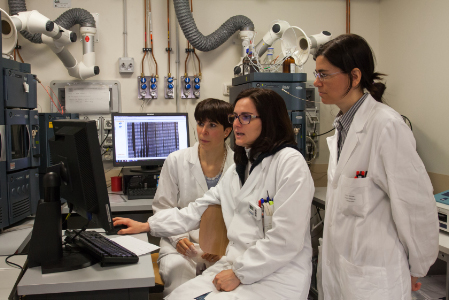Systemic lupus erythematosus (SLE) is a prototypic autoimmune disease with complex and unclear etiology (1). The development of SLE has been so far mainly
attributed to altered B and T cell selection and/or tolerance, while the contribution of innate cells is less understood. Furthermore, an unexpected anti-inflammatory
and protective role of B cells and T cells (B regulatory and T regulatory cells) in several autoimmune diseases, including SLE, has been more recently described (2,3).
Mice lacking Lyn, a Src-family kinase mainly expressed in B and myeloid cells, are a well established model of lupus-like autoimmunity (4,5). Importantly, genetic
associations of mutations in the Lyn gene with SLE in humans have been reported (6). Lyn-/- mice develop progressive autoimmunity characterized by autoantibody
production, lymphocyte activation, immune complex deposition and nephritis (4). The development of autoimmunity in lyn-/- mice has been mainly attributed to
alterations in B cell signaling thresholds, leading to abnormal B cell selection and/or tolerance resulting in production of self-reactive antibodies (4). Lyn is also a
negative regulator of myeloid-cell signaling thresholds; lack of Lyn in these cells leads to increased myelopoiesis and hyper-responsiveness after engagement of
surface integrin and cytokine stimulation (7). Dr. Scapini and her collaborators recently found that the deregulation of myeloid cell responses in lyn-/- mice, leads to
the generation of a cytokine inflammatory loop, mediated by the over production of B cell activating factor of the TNF family (BAFF/BLyS) by myeloid cells and
Inteferon-gamma (IFNg) by T cells, that is crucial for disease development and progression (5). The important role of inflammation and myeloid cells in
Lyn-deficient autoimmunity is also supported by our more recent observation, that in the absence of the anti-inflammatory cytokine interleukin-10 (IL-10), mice
develop a dramatic exacerbation of myeloid and T cell activation/proliferation, pro-inflammatory cytokine production and tissue inflammation leading to severe
end-organ damage and early mortality (8).
Overall, these data strongly suggest that inflammation and myeloid cells might be important contributors to loss of self tolerance and SLE development. However, one
of the main limitations of the studies performed so far utilizing murine models of SLE, including lyn-/- mice, is that disease development is the result of the effects of
genetic modifications that affect multiple different cell types simultaneously. In these conditions, the understanding of the contribution of a specific cell type to the
overall disease has been difficult. In this context, by taking advantage of the innovative loxP-Cre technology, that results in cell lineage-dependent deletion in specific
target molecules (9), we have recently generated Lyn flox/flox conditional knockout mice that, combined with cell-type specific Cre-loxP lines (see below), have
allowed us to selectively genetically delete Lyn in different types of myeloid cells (such as dendritic cells, monocytes/macrophages and neutrophils).
The main goal of this study is to investigate the specific contribution of different myeloid cell subtypes to the development of inflammation/autoimmunity. Particular
attention will be dedicated to the understanding of the mechanisms through which specific myeloid cell subtypes can modulate the activatory/inhibitory functions and
plasticity of B and T cells initiating pathogenic processes, such as inflammation and loss of tolerance, that can ultimately lead to SLE development. For this purpose,
combined studies of animal models of this disease (mainly Lyn flox/flox conditional knockout mice) and SLE patients will be performed.
The







